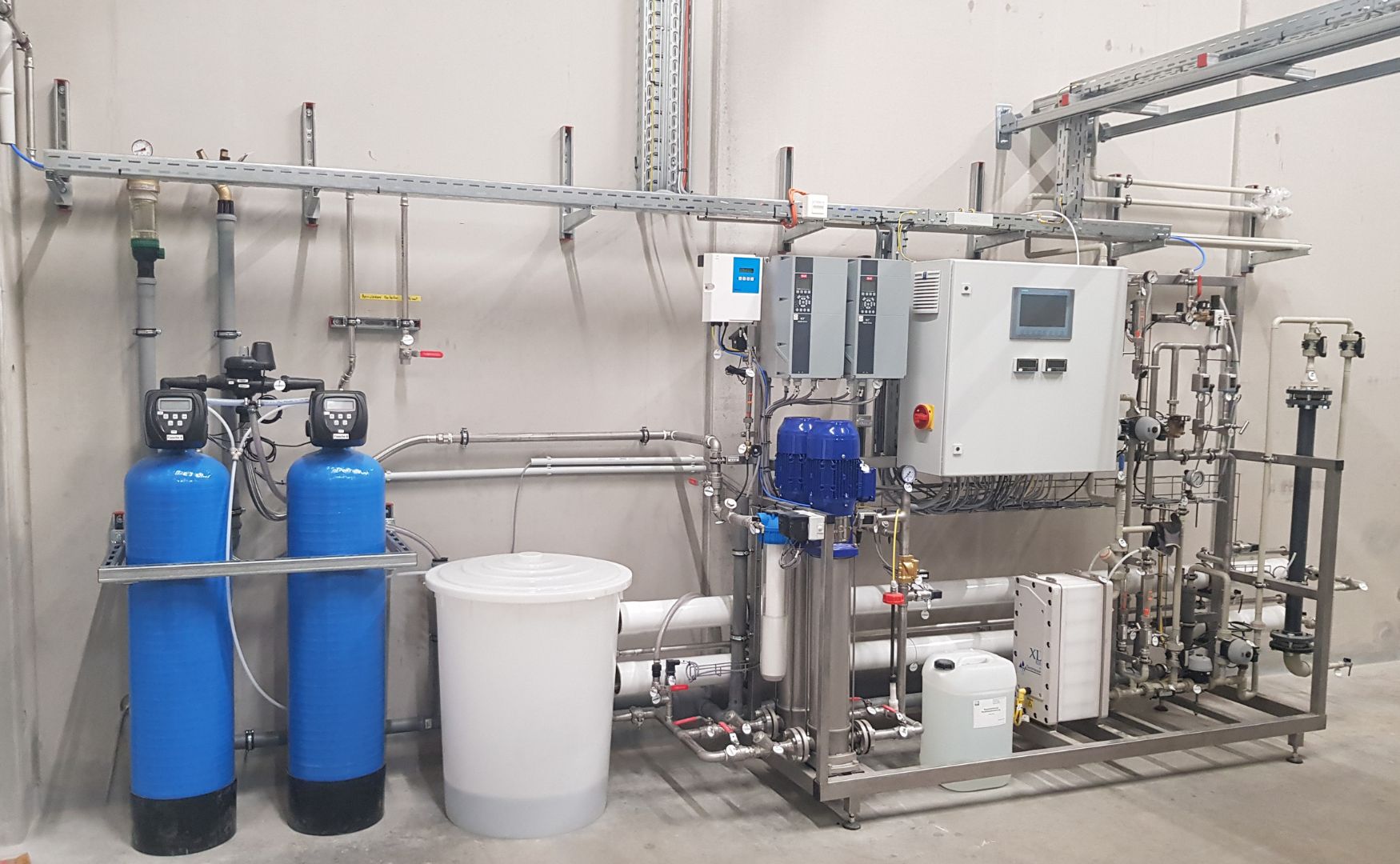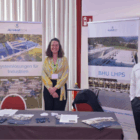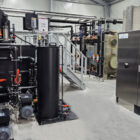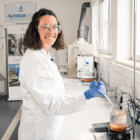Electrodionization (EDI) is an innovative process in water treatment that is used to produce high-purity water. EDI combines ion exchange and electrodialysis and enables continuous desalination of water without the use of chemical regenerants. This technology is particularly useful in applications that require high purity, such as electronics manufacturing, the pharmaceutical industry and power plant boiler systems. EDI systems are typically installed downstream of reverse osmosis (RO) systems and remove residual ions to achieve ultra-pure water with extremely low conductivity.
Table of contents
Technical basics of electrodeionization (EDI)
EDI technology is based on the principle of ion exchange in combination with an electrical voltage that enables the regeneration of the ion exchange resins. The structure of an EDI cell consists of several alternately layered cation and anion exchange membranes as well as ion exchange resins between the membranes. Applying a DC voltage creates an electric field that attracts the ions in the ion exchange resins ion exchange resins and directs them into the concentrate chambers, eliminating the need for chemical regeneration.
Structure of an EDI cell
- Ion exchange membranes:
- In an EDI cell, cation and anion exchange membranes are arranged alternately to conduct ions. Cation exchange membranes allow positive ions to pass through, while anion exchange membranes allow negative ions to pass through.
- Ion exchange resins:
- These resins serve as a conductive medium that absorbs and transfers ions. The resins are charged by the electric field and enable the continuous release of ions into the concentrate chambers, making chemical regeneration unnecessary.
- Electrodes:
- Two electrodes generate an electric field within the cell, which moves the anions to the anode and the cations to the cathode.

Photo: Ultrapure water system with EDI ALMA OSMO VE
Functionality and process of EDI
The raw water first passes through a reverse osmosis system (RO)to remove most of the ions. The pre-purified water is then fed into the EDI unit. In the EDI cell, the ions are continuously removed from the raw water by the electric field and fed into the concentrate chambers. In these chambers, the concentrate water is either discharged or returned to the circuit. The EDI thus ensures almost complete deionization and produces water with a very low conductivity, usually below 0.1 μS/cm.
Advantages of electrodeionization
EDI offers several advantages over traditional deionization processes, such as ion exchange technology with chemical regeneration:
Continuous operation option:
- As EDI works without chemical regeneration, the system can run continuously and does not require regeneration cycles.
No chemical regeneration:
- In contrast to conventional ion exchangers, which have to be regularly regenerated with acids and alkalis, regeneration in the EDI is carried out by the electric field. This results in lower operating costs and less environmental pollution from chemicals.
High water purity:
- EDI achieves conductivities below 0.1 μS/cm and offers extremely high water quality, making it ideal for applications that require extremely pure water.
Space-saving and efficient:
- Thanks to its modular design, EDI can be integrated in a space-saving manner. Continuous deionization also requires less energy compared to conventional ion exchange technology.
Areas of application for electrodeionization
EDI is particularly useful in industries that have stringent water quality requirements, including:
pharmaceutical industry:
- EDI is used to produce high-purity water, which is essential in pharmaceutical processes. The constant water purity and the avoidance of chemical regeneration agents make EDI ideal for these applications.
Electronics and semiconductor production:
- The electronics industry requires ultra-pure water, especially for cleaning microchips and wafers, as even the smallest impurities can affect product quality. EDI meets these requirements by continuously supplying water with extremely low conductivity.
power plant industry:
- In power plants, pure water is required for boiler systems and steam generation. EDI is often used in combination with reverse osmosis systems to deionize the water before it is fed into the boilers, thus preventing corrosion and deposits.
Food and beverage industry:
- EDI is also used in food and beverage production, particularly in the production of distilled water or for water treatment in beverage production, where high water purity and low mineral content are required.
Technical requirements and challenges
- Water quality of the feed water: As EDI relies on ion-free or almost ion-free feed water, pre-treatment of the water, usually by reverse osmosis, is recommended. Too many residual ions or high degrees of hardness can impair the performance of the EDI cell.
- Electrical energy: The EDI requires a constant supply of electrical energy to maintain the electrical field for continuous ion separation. Therefore, the energy efficiency and stability of the power supply is an important technical requirement.
- Maintenance requirements: Although EDI requires less maintenance compared to conventional systems, it is still necessary to check and clean the membranes regularly to prevent biofouling and deposits.
Conclusion
Electrodionization (EDI) is a sustainable, economical and highly efficient technology for the production of high-purity water. By combining ion exchange and electrodialysis, it enables continuous water treatment without chemical regeneration. In many industries, from pharmaceuticals to electronics, EDI has proven to be indispensable as it meets the highest standards of purity. ALMAWATECH supports industrial applications with customized EDI systems that are reliable, space-saving and environmentally friendly, meeting the complex requirements of modern water treatment.
For further information on our products, please feel free to contact us at any time!








